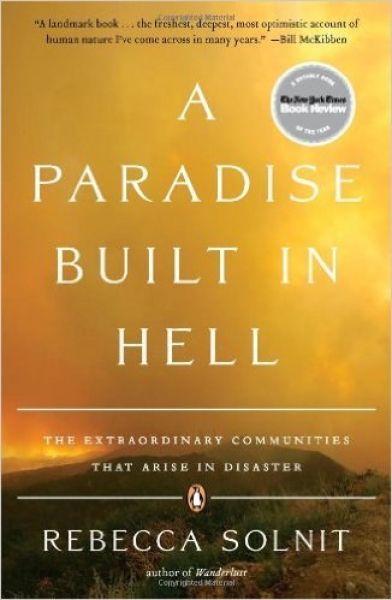Grim Reality
A Paradise Built in Hell: The Extraordinary Communities That Arise in Disaster
By Rebecca Solnit

30 Aug, 2016
0 comments
Rebecca Solnit’s A Paradise Built in Hell: The Extraordinary Communities That Arise in Disaster is an unmitigated attack on niceness, kittens, and chocolate … or at least on one of the essential assumptions of modern society. Waterboard an author and the odds are they will eventually confess they believe society is perpetually poised on the brink of collapse, requiring only the impetus of some calamity, natural or otherwise, for that collapse to be realized. This is a widespread belief: it informs our entertainment and it shapes public policy.
There is just one problem. It’s not actually true. Not the way its believers believe it to be true.
Solnit draws on a wide variety of cases: the 1906 San Francisco earthquake, the Halifax Harbour explosion, the Managua earthquake, Katrina, to name just a few. The recurring pattern in the calamities Solnit examines — earthquakes, floods, ice storms — is that the first instinct most people have, regardless of nation or race, is to try to help their neighbors, even those who were strangers the day before. Whether it’s building ad-hoc soup kitchens in the middle of the rubble that used to be a town or acting as self-appointed traffic wardens, responses are constructive or at least intended as positive
The violent reaction seems to come from people, often those in charge, who are convinced that the masses or at least a significant fraction of them, are three meals away from anarchy. This can take the form of panicky officials unleashing soldiers on the citizens or self-appointed vigilantes defending escape routes from those who need to use them. It’s not a Lucifer’s Hammer-esque scenario at all, but rather a reaction to it from people who firmly believe they are surrounded by barely constrained monsters.
Long term social turmoil appears to be driven not by the actual calamity but by inept official response. Bush didn’t lose the mandate of heaven because New Orleans was flooded. He lost it because his appointees were inept. The earthquake that flattened Managua in 1972 might have been survivable for the Somoza regime; funneling off aid money apparently was not.
While Solnit’s text seems to be biased by an apparent belief that the average people on the street are not ravening monsters waiting for a flimsy excuse to make dresses from the flesh peeled off their neighbor’s faces — sometimes putting a more charitable on events like Miskito-Sandinista relations than I would — and while she has an apparent weird, quasi-utopian conviction that obviously proper policies like the neo-liberalism that has justly guided the world should for some reason be cast aside merely because their predictions fail and they do not provide the results promised — I find her basic arguments convincing. It is not because I want to believe them (who doesn’t love knowing one is the only true human surrounded by zombies-to-be one virus away from rampage?) but because her claims match my experience: Montreal did not collapse into cannibalism after the ice storm, Kitchener was not overrun by armed mobs after the Americans crashed the electrical grid in ’03. Disappointing but true: the first visible reaction to the blackout in Kitchener was the appearance of volunteer traffic wardens at every intersection.
As a book reviewer, I of course ignore minor issues like “can we avoid making disasters worse by adopting policies that take actual human nature and not scare stories into account” so I can focus on what really matters: is it possible to take Solnit’s observations into account without making it impossible to write thrilling novels of adventure? Can there even be fiction without wandering mobs of cannibalistic whoever annoyed Jerry Pournelle this week? Or by writing this book, has Solnit inadvertently attacked the very basis of entertainment? Is there even art if our neighbors are not monsters?
I think each of us has to decide this for ourselves, based on the evidence and how badly our self images would be threatened if it turned out our neighbors were not so bad after all.
A Paradise Built in Hell is available here.
